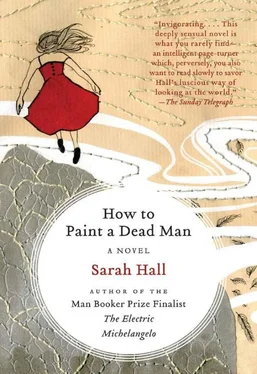Sarah Hall - How to Paint a Dead Man
Здесь есть возможность читать онлайн «Sarah Hall - How to Paint a Dead Man» весь текст электронной книги совершенно бесплатно (целиком полную версию без сокращений). В некоторых случаях можно слушать аудио, скачать через торрент в формате fb2 и присутствует краткое содержание. Год выпуска: 2009, Издательство: Harper Perennial, Жанр: Современная проза, на английском языке. Описание произведения, (предисловие) а так же отзывы посетителей доступны на портале библиотеки ЛибКат.
- Название:How to Paint a Dead Man
- Автор:
- Издательство:Harper Perennial
- Жанр:
- Год:2009
- ISBN:нет данных
- Рейтинг книги:4 / 5. Голосов: 1
-
Избранное:Добавить в избранное
- Отзывы:
-
Ваша оценка:
- 80
- 1
- 2
- 3
- 4
- 5
How to Paint a Dead Man: краткое содержание, описание и аннотация
Предлагаем к чтению аннотацию, описание, краткое содержание или предисловие (зависит от того, что написал сам автор книги «How to Paint a Dead Man»). Если вы не нашли необходимую информацию о книге — напишите в комментариях, мы постараемся отыскать её.
, Sarah Hall, "one of the most significant and exciting of Britain's young novelists" (
), delivers "a maddeningly enticing read... an amazing feat of literary engineering" (
).
How to Paint a Dead Man — читать онлайн бесплатно полную книгу (весь текст) целиком
Ниже представлен текст книги, разбитый по страницам. Система сохранения места последней прочитанной страницы, позволяет с удобством читать онлайн бесплатно книгу «How to Paint a Dead Man», без необходимости каждый раз заново искать на чём Вы остановились. Поставьте закладку, и сможете в любой момент перейти на страницу, на которой закончили чтение.
Интервал:
Закладка:
The job is interesting enough. You don’t have to be at the gallery until midday, and it’s a short walk across the heath from the flat. You suppose you qualify as management, though this has never quite been made clear. You were solely responsible for the place while Angela was on maternity leave. You help arrange the collections, write press releases, and dress the rooms. You’re usually the last to leave. You check the thermostat, switch off the lights and lock up at 6 p.m. This gives you the champagne-diamond light of London’s mornings to be at one of the studios, or to go to the lab for printing, have a run, spread a piece of toast with butter, shower, and then step into a dress or a suit. From bohemian to corporate.
When asked, over canapés and sparkling wine at viewings and parties, what it is that you do, you say you are a curator. You say nothing about photography, the Deutsche Börse, the royal portrait. It’s simpler that way. There are days when you feel like a fraud for saying it; it isn’t what you really do, it isn’t how you see yourself. But there are days you feel like a fraud for signing your work, putting your surname to it. There’s no getting away from the man that name belongs to, he who has long been established as one of the country’s greatest landscapists, he who is one of his generation’s formidable male eccentrics.
Peter Caldicutt: reliably outspoken, dashing and dishevelled, a British Council-hating Communist who is liable to drunkenly piss in nineteenth-century museum fountains after previews, and who is the subject of two short BBC films. Your dad. His paintings were the first thing you understood to be art. You had no true notion of his reputation until you went away to art college and your tutors began asking questions about what your father was really like and whether he taught you what you knew. It was just his job, making pictures. Sometimes there was money. Other times there were spells of relying heavily on the vegetable patch in the garden and on the chicken coop, and a bit of poaching on the estate. Times when your mum worked two or three jobs. Only when you became a teenager did things seem easier, and the newfound security manifested in overseas travels, the conversion of the outbuildings, and an annual young-artist award set up in his name.
You and Danny were neither encouraged into nor intimidated out of the foundation year. Danny dropped out, predictably, and seemed only to want to go because you were going. I’ll enrol if you do, Suze. You finished with high marks and applied to universities. In the acceptance letter from Goldsmiths they asked for grades much lower than the prospectuses had indicated. If you’d been Susan Smith or Jones, Patel or McMillan, no doubt it would have been different. But you were Susan Caldicutt. You were, after a fashion, a celebrity daughter. Your dad was madly proud, and oblivious to the fact that he might have had, inadvertently, a hand in everything.
But even left to your own devices, there was not much chance you’d have been a brain surgeon or an accountant. Not with this colossal man in the foreground, who smoked dope and rock-climbed with the Earl’s sons, who walked around either stark bollock-naked or dressed for the theatre, who bivouacked next to precipitous cairns and had parties wilder than you and Danny. Not with the mysterious, rag-strewn room upstairs in the cottage, intermittently rendered off-limits by this seven-foot, wild-eyed, bereted king, and host to, it seemed when you were young, all the summits of human expression possible. Not with those vertiginous oil paintings hung in every alcove-even over the toilet-which you could stare at for hours and still never be able to say what it was about them you loved.
There was no getting around your father. His vim. His magnetism. The stories he used to tell you, about The Scenes, Those Days, The Decade. About Picasso and St Ives and LSD. At your school he was known as The Beardy Weirdy, or Caldicurser —the dad who swore all the time, regardless of the teachers. Had a good bloody day, kids? Give the car a shove, the fucking battery’s dead again.
There were times you didn’t get on. Times when he infuriated and embarrassed you, was too loud and opinionated, too unmanageable — going on the radio, telling it like he saw it, being controversial, not being sober. I’m not black and I’m not a lesbian, but I like a drink, and that’s what you people find interesting about me. Not the fucking art, you ignorant bastards, looking for your industry darlings and your Oxford crew. Howay, you wouldn’t recognise talent if it crawled up inside your arse-hole. The dead airwaves. The apologies. There were times you wanted him to just be normal. To just shut up for a minute. You had your spats, your rows, and your rebellions over the years, though what constituted a rebellion when you had permission to curse, get laid, get high, travel abroad, all before you were sixteen, you never really knew.
You disliked yourself for not liking him. You always wanted to have your mum’s stoicism or Danny’s attitude of acceptance. It was so admirable, your brother’s approach to dealing with him. Do as Dad does. Drink the lethal homebrew. Get loaded. Dance in the supermarket. Read the poetry out loud. Be unabashed, be uninhibited, be free. Join the madness, is what it amounted to. Put on lunatic garb like the Emperor. And Danny never minded; he could always go there. Danny, with his family zest and his eternally game spirit. Danny with his early weakness for booze and weed, and his advocacy of all things liberal and life-affirming.
Even these last few years, the gap was there. Wilse wants us home for Guy Fawkes, your brother would inform you over the phone, he’s planning some kind of shindig. He’s built the Houses of Parliament up on the moor. And you’d complain, and he’d say, Hey, come on, it’ll be a laugh. I’m making a mini-Blair for the roof. He’s got a rocket in his arse. You might be the artist, but you’re also the impostor. Danny was the true chip off the old block, the apple not far fallen from the crooked tree.
Your commute on foot to the gallery, over the blustery stretch of heath, is almost satisfying enough to make living in the city worthwhile. This is what you tell yourself every day. It’s nothing like your formative landscape though, nothing like the wet invigorating ticking in the air up there, the ripe horizons, the freshened skin. But it’s the trade-off for demanding something more cosmopolitan out of life, for weighted salaries, opportunity, and being able to get a takeaway at 4 a.m.
You’re fond of the heath. While others scream themselves hoarse and escalate their blood pressure on the M25, or sardine it on the tube, you get to stroll across this cultivated wilderness. The stress of the city is temporarily jettisoned here. Kids canter about in pleated school uniforms, launching plastic sandwich boxes on the pond. Cat-hipped mothers push prams and lend lip-gloss to each other while dogs hurtle after balls. This is the meteorological zoo where the city keeps its winds. Up above, kites with streamers pitch and drag in the buffeting air. As you walk your hair straightens, your skirt snaps and flutters. In the summer you watch people wilt on blankets and pet heavily, like the couples on the prohibition signs at swimming pools. In winter, fog and rain obscure the racks of period houses on either side. You squint and step off the tarmac paths bisecting the expanse and lose your coordinates momentarily. You pretend it is your home county underfoot, crusty with moor grass and prudishly draped with cloud. Ten minutes after setting off across the heath, you arrive at work.
The current exhibition will be something of a novelty. You still aren’t entirely sure about its concept. At first you did not like the idea at all. Being something of a purist, it sounded to you like a gimmick, its focus on personality rather than art. You thought the public wouldn’t want to pay to see a collection of memento mori and soiled knick-knacks. But Angela was gung-ho as usual. She secured loans from private museums, archives and well-off families, and the show is going ahead. Currently en route to Borwood House are a number of heavily insured dispatches containing some real anthropological curiosities. There are combs, and surrealist pipes, callipers, brass-handled syringes with needles still bearing addict DNA, tooth-cups and hairbrushes. There’s a wicker girdle used by Manet that is currently listing in the Channel, waiting for permission to enter the port of Dover. There are spectacles, monocles, inkwells, and beads. A pair of bed slippers. A lock of hair from Kokoschka’s infamous doll. There are handkerchiefs, photographs, letters, and the Italian diary, which Tom is translating.
Читать дальшеИнтервал:
Закладка:
Похожие книги на «How to Paint a Dead Man»
Представляем Вашему вниманию похожие книги на «How to Paint a Dead Man» списком для выбора. Мы отобрали схожую по названию и смыслу литературу в надежде предоставить читателям больше вариантов отыскать новые, интересные, ещё непрочитанные произведения.
Обсуждение, отзывы о книге «How to Paint a Dead Man» и просто собственные мнения читателей. Оставьте ваши комментарии, напишите, что Вы думаете о произведении, его смысле или главных героях. Укажите что конкретно понравилось, а что нет, и почему Вы так считаете.












